 Petzlover
Petzlover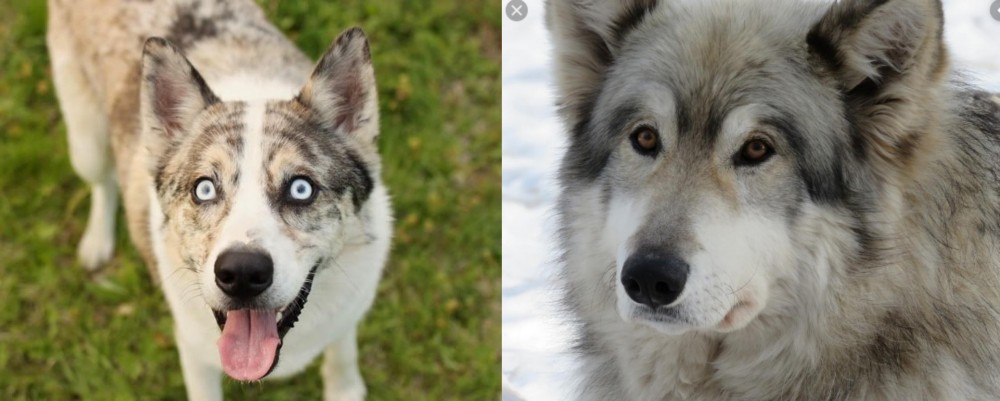 Shepherd Husky is originated from United States but Wolfdog is originated from Germany. Shepherd Husky may grow 12 cm / 4 inches shorter than Wolfdog. Both Shepherd Husky and Wolfdog are having almost same weight. Both Shepherd Husky and Wolfdog has almost same life span. Both Shepherd Husky and Wolfdog has same litter size. Both Shepherd Husky and Wolfdog requires Moderate Maintenance.
Shepherd Husky is originated from United States but Wolfdog is originated from Germany. Shepherd Husky may grow 12 cm / 4 inches shorter than Wolfdog. Both Shepherd Husky and Wolfdog are having almost same weight. Both Shepherd Husky and Wolfdog has almost same life span. Both Shepherd Husky and Wolfdog has same litter size. Both Shepherd Husky and Wolfdog requires Moderate Maintenance.
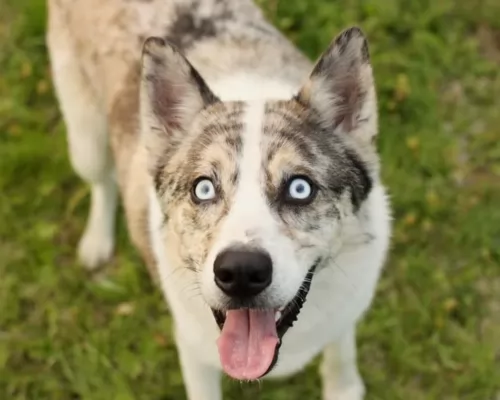 What a beautiful dog the Shepherd Husky is. He is a mix between the Husky and the German Shepherd. Other names for him include Gerberian Shepsky, German Husky and Siberian Shepherd.
What a beautiful dog the Shepherd Husky is. He is a mix between the Husky and the German Shepherd. Other names for him include Gerberian Shepsky, German Husky and Siberian Shepherd.
The German Shepherd originated in Germany and the Husky is from Siberia. We assume this mixed breed dog was bred in the USA. The true origin of the German Shepherd Husky dog is unclear but both the parent breeds have long histories.
The dog is recognized as a Hybrid by both the Dog Registry of America as well as the American canine hybrid Club.
 The Wolfdog was brought about when domestic dogs were mated with a variety of wolves so as to produce a hybrid.
The Wolfdog was brought about when domestic dogs were mated with a variety of wolves so as to produce a hybrid.
People who want to own these hybrids have to be careful because they find that the unpredictable behavior of their pets makes it difficult for them to care for them.
Then they want to get rid of it. Every year, heaps of these hybrids are abandoned due to humans interfering with nature.
The wolfdog has been bred with a number of dogs but we think about it more in terms of wolf and German shepherd.
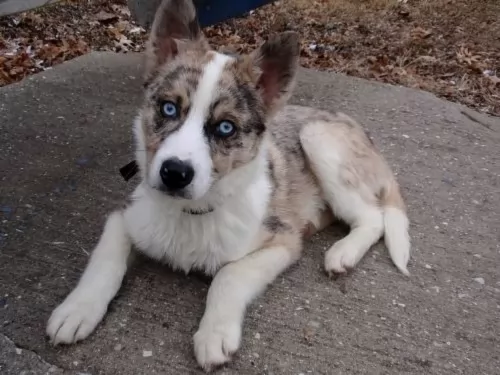 Solid and strong, the German Shepherd Husky mix is attractive. He is a fairly large dog standing at 51 to 64cm in height and weighing between 20 to 40kg.
Solid and strong, the German Shepherd Husky mix is attractive. He is a fairly large dog standing at 51 to 64cm in height and weighing between 20 to 40kg.
They’re powerful dogs these as they have a long history of being working dogs. The eyes of this beautiful dog can be brown, green or blue or a mix of these. The thick double coat protects them from the cold and in the warmer months, he sheds quite a bit.
The coat can be brown, black and tan or it can have creamy shades and be mixed with grey and white too.
The Shepherd Husky is a friendly, amicable dog who wants to please his owner. Training and socialization make him even more well adjusted. He is a dog that will get on well with children in the home as well as other dogs.
He is such an all rounder this dog – loyal, intelligent, social and loving - being great for accompanying you on walks and hikes but being willing to sit with you indoors too.
While he is adaptable and good natured and will happily live with his owner in the city or the countryside, he is better suited to life in the countryside. He also makes a great guard-dog.
 People mesmerized by the wolf long to bring some of that wildness home, and the wolfdog is supposed to do this.
People mesmerized by the wolf long to bring some of that wildness home, and the wolfdog is supposed to do this.
Their looks differ a lot, even those that come from the same litter. You can’t have a predictable looking wolf dog because it could be any domestic dog bred with a wolf so they display a large variety of appearances.
Most Wolfdogs seem to have smaller heads than pure wolves. The ears seem to be bigger and more pointy.
A popular wolfdog mix is a German Shepherd mixed with the wolf. These dogs can be between 70 to 76cm in height and weigh between 40 and 45kg.
Their coat is thick and can be in colors of grey, cream, red, white, dark brown and black.
While the wolfdog can be trained to become quite a friendly kind of dog, it is not suitable for the first time dog owner. It can show bouts of aggressiveness around strangers and be highly protective of its family.
However, this can be helped with early socialization and training. It is illegal to own the wolfdog in some states. You don’t want to leave a wolfdog alone with your children even though the dog is capable of love and loyalty towards his human family.
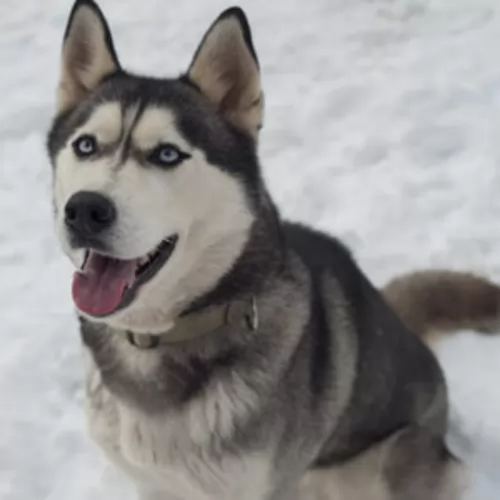 The German Shepherd Husky mix is such an ideal dog for single people, couples and families. This wolf-like breed is intelligent, loving,social and protective – the ideal family dog.
The German Shepherd Husky mix is such an ideal dog for single people, couples and families. This wolf-like breed is intelligent, loving,social and protective – the ideal family dog.
For those looking for an active dog that can be their jogging, walking and camping partner, this dog is for you. He loves to be busy, but he also loves being made a fuss of indoors too.
He has so many excellent qualities and is one dog breed that ticks all the right boxes for being such an all-round splendid pet and companion.
 When you add the genes of a wild animal to the pool, you get a crossbreed and when its an animal from the wild, its nature is unpredictable.
When you add the genes of a wild animal to the pool, you get a crossbreed and when its an animal from the wild, its nature is unpredictable.
Many people don’t think about the consequences of what they do when they interfere with nature and the wolfdog gets put down when it behaves like a wild animal and attacks or bites out of defense.
Yes, they can be loyal, loving pets but always you will have the shadow of the dog or wolf’s unpredictable behavior.
There is a reason why these dogs are banned in a number of states. This dog-type-wolf breed is not recommended as a pet at all – take a look at animal shelters and the number of wolf dogs there and ask yourself why.
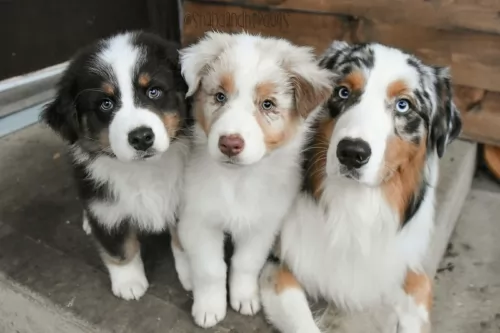 This is such a robust dog that you an scarcely think of him being sickly and yet there are some illnesses that are common to all dogs and which your German Shepherd Husky mix might get as well.
This is such a robust dog that you an scarcely think of him being sickly and yet there are some illnesses that are common to all dogs and which your German Shepherd Husky mix might get as well.
Hip dysplasia is common in German Shepherd dogs as well as arthritis and thyroid dysfunction. Bloat and cancer are other diseases to watch for.
Canine hip dysplasia is a genetic disease characterised as a disease of the hip. The malformation can lead to arthritis and pain and ultimately lead to the loss of hip function, crippling your dog.
You will need to get your pet to the vet for treatment to make his life more comfortable.
 They will also be susceptible to common dog ailments such as parasites and hip dysplasia.
They will also be susceptible to common dog ailments such as parasites and hip dysplasia.
Like any other dog, these Wolf dogs will also possibly develop tumors. He will also need to be vaccinated against harmful diseases and you will need to have a reliable local vet who is interested in your wolf dog.
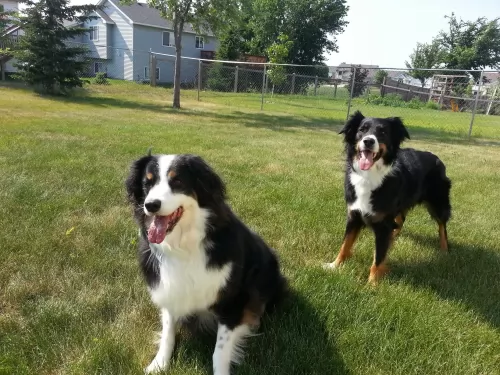 ◆Brush the coat of your Shepherd Husky twice a week to rid the coat of loose hairs. This dog’s hair sheds quite heavily as the weather warms and he may require brushing more often.
◆Brush the coat of your Shepherd Husky twice a week to rid the coat of loose hairs. This dog’s hair sheds quite heavily as the weather warms and he may require brushing more often.
◆When you brush him, check the ears and eyes for infection. The eyes must be bright and clear.
◆Feed your Shepherd Husky the best food there is as he is an energetic, working breed. The commercially manufactured foods can be a good, convenient choice but you need to make sure it is one of the better brands.
Some of the cheaper brands are full of bad ingredients that can make a dog sick.Try and give him some home-made foods that are healthy and nutritious. This food can be added to his dry kibble twice a week.
Boiled chicken, brown rice or pasta and spinach, sweet potatoes and carrots are a tasty healthy choice for your pet. Try and include some raw meat into the diet as well.
 If you own a wolfdog the same care procedures would need to be followed as you would with a regular dog.
If you own a wolfdog the same care procedures would need to be followed as you would with a regular dog.
A wolfdog, however, can’t be vaccinated against rabies. It seems that the reason for this is that it is due to current legislation, and vaccine manufacturers don’t want to support wolf dogs as pets because they are considered to be dangerous.
Provide your wolfdog with highly nutritional, protein-based food. You don’t want to feed your wolfdog any of the low quality, traditional store-bought food high in carbs and artificial additives. Instead, look for a diet rich in proteins and be sure to give this dog some raw meat occasionally.
The dog is active and you will need to provide heaps of exercise for him, both mental and physical activities.
The wolfdog will require training but it will require dedication, though it can be done as the dog is very intelligent.
Even with training, the wolfdog isn’t suited to life in the city but should be kept in the countryside.